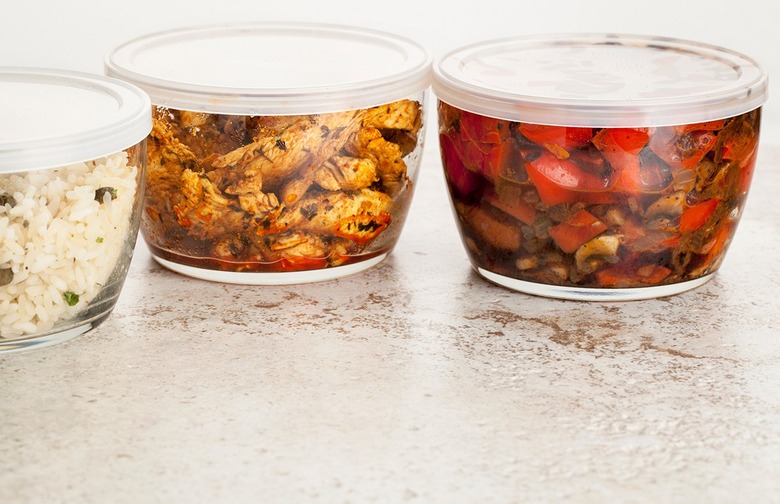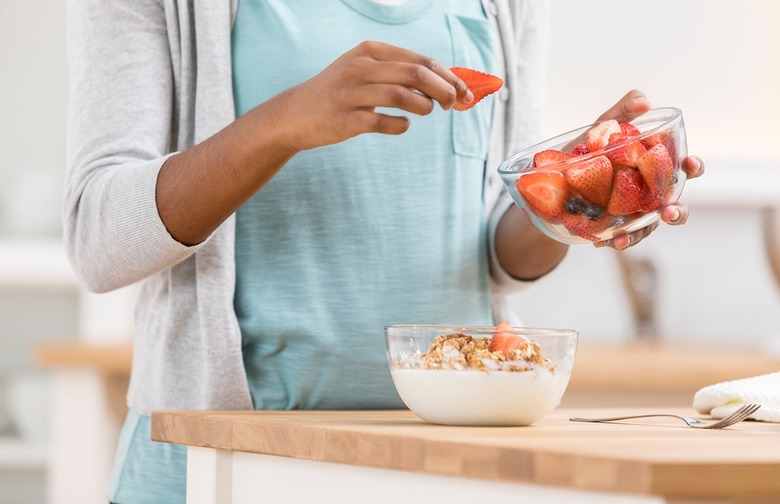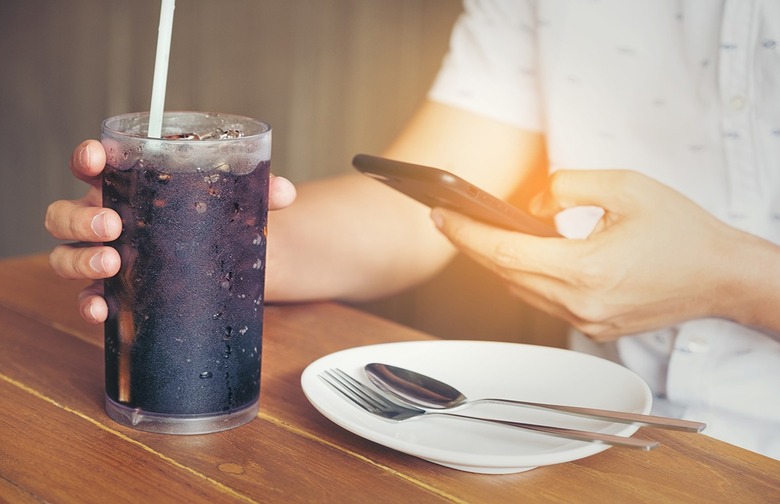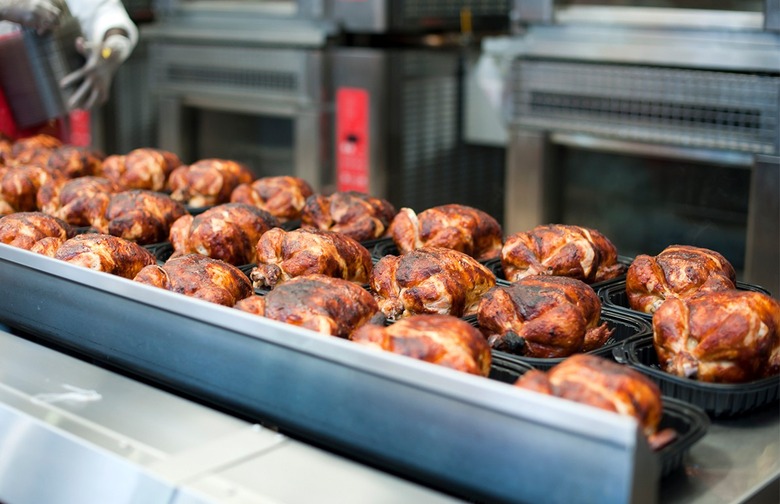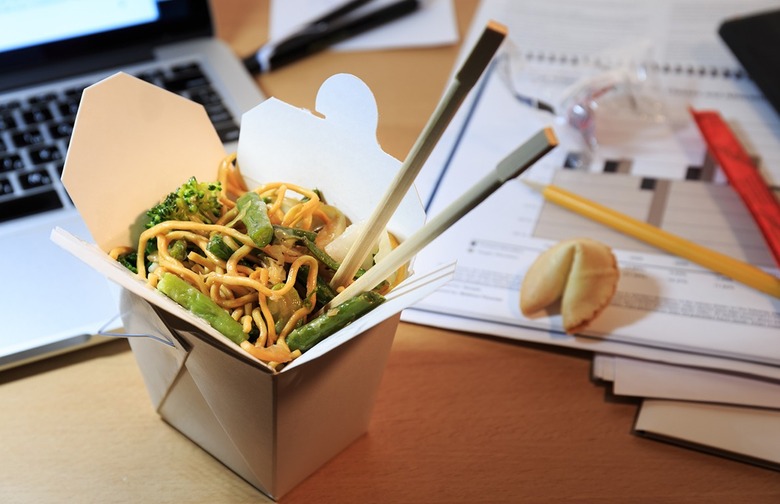16 Eating Habits You Need To Stop Immediately Gallery
Old habits die hard. With food especially, it can be challenging to break free of a habit once it sticks. But you can't even start breaking your bad habits if you don't know what they are.
Sure, some habits are easy to spot. For instance, if you reach for a cupcake every time you start to feel stressed, you're probably aware that it isn't the healthiest way to cope long-term. If you guzzle energy drinks day in and day out, that's a habit that's easy to spot. But what about the more subtle ones, the habits you might not even realize you're guilty of?
Each and every day you make hundreds of decisions related to food. Most of these you just do without even thinking about it. But it can be helpful every now and then to take a step back and assess. Are the habits you're used to following with your diet making you feel good? Are you feeling tired, lacking focus, or experiencing energy crashes? If so, it might be time to switch things up. Here are 16 common eating habits you should stop immediately.
Replacing Meals With Snacks
Don't get us wrong, there's nothing wrong with a little snacking to get you through the day. Need to tide yourself over until dinner? Grab a nutritious snack. Saw a cookie in a bakery window that looks too good to be true? Treat yourself to a sweet bite to eat. But too many busy people forego their actual meals entirely in favor of convenient snack options. In fact, a recent study found that millennials are especially guilty of this bad snack habit. As healthy as some snacks are, they can't compete with a full and balanced meal. Make sure you're getting the nutrients you need by eating three full meals a day.
Not Drinking Enough Water
It's too easy to forget to stay hydrated, especially on busy days. But drinking water is one of the most important things you can do for your health! Your body uses water for almost literally every biological process it performs each day. Plus, when you don't drink enough water, it can make you feel lethargic, dry out your skin, and result in headaches and muscle pain. When we asked 10 nutritionists what they thought, here's how much water they recommend you drink every day. Are you getting enough?
Suppressing Cravings
Cravings might seem annoying, but when you think about it, they're only really annoying if you criticize them. What's wrong with indulging in a little ice cream when a craving strikes? Cravings, when suppressed, only get stronger. If you ignore them, they're going to bounce back. Just like a slingshot, when you do finally cave in it's going to be more extreme the more you tried to pull it back. Sometimes your cravings are random, but sometimes they're trying to tell you something. Think of cravings instead as information. Why do I want this food? What do I need?
Leaving Food Out Too Long
Picnics and cookouts are some of summer's greatest joys, but they're also part of the reason food poisoning ramps up in warmer seasons. People don't realize how long their leftovers have been sitting out, and because of that they end up exposing themselves to foodborne bacteria. Cooked food should never be left unrefrigerated for more than two hours. Put your leftovers away quickly — and please don't eat that leftover slice of pizza after it's been sitting out overnight.
Eating on the Go
We've all been there. Rushing out the door, chowing down on a sandwich while you jump in your car to get to work, school, or the next commitment. Living a busy lifestyle can make this difficult, but it's worth it to sit down — even for just a few minutes — and truly enjoy your food. Studies show that people who eat sitting down feel fuller and more satisfied by their meals than those who eat while standing or walking. That being said, some days a sit-down meal just isn't possible. Here are some healthy breakfasts you can take on-the-go so you don't have to rely on toaster waffles.
Opting for Low-Fat or Sugar-Free Alternatives
The low-fat or sugar-free versions of your favorite foods probably look like the healthier choice. But in many cases, especially for dairy items such as yogurt or cheese, low-fat often translates to low-nutrient. Fat-free versions of foods will often compensate for the lack of fats by adding extra processing and simple sugars. Sugar-free foods will replace sugar with artificial sweeteners such as sucralose and aspartame.
Not Eating Regularly
The average person eats every three to four hours. When you go longer than that, your energy starts to go down, you get "hangry," and your metabolism may be affected. Plus, getting on a somewhat regular eating schedule can help you plan ahead and make sure you have food available when hunger strikes.
Skipping Breakfast
They call it "the most important meal of the day," and while there's some debate on that, there's no doubt that breakfast is important. Some studies show that skipping breakfast can be detrimental to your metabolic health. Other studies have linked skipping breakfast to an increase in complications from diabetes. Whip up a simple, healthy breakfast in minutes with these on-the-go options.
Drinking Lots of Soda
There's a reason some nutritionists refuse to every buy soda at the grocery store. There's just nothing nutritious about it. Soda is made primarily of sugar, chemicals, and other non-nutritious ingredients. If you sip on soda for the caffeine, you'd probably be better off drinking coffee. And if you turn to soda when a sugar craving hits, consider one of these healthier sweet beverages instead.
Eating Only Processed Foods
A processed snack or pre-packaged meal now and then won't kill you. If you love eating processed snack foods like protein bars or cheese sticks, don't panic. There are worse things you could do to your body than eat something that's undergone processing. However, getting a majority of your fuel from these foods is not a good idea. Whole foods such as grains, fruits, vegetables, and nuts contain essential nutrients your body needs. A protein bar and some chips might fill you up for lunch, but it's not the same for your body as eating a home-cooked meal!
Not Washing Your Hands Before You Eat
The biggest thing you can do to prevent food poisoning? Wash your hands! You should always wash your hands before eating or preparing food. Hand sanitizer is a good alternative for when you don't have access to a sink, but it's never as effective. Hand washing should be done with soap and warm water; ensure you lather for at least 20 to 30 seconds. The friction is how most of the bacteria get washed off.
Choosing Foods Based on Calories
Calories in equal calories out? Not so much. Your body is more complex than that! If you eat a 100-calorie snack pack, it's not the same as eating a spoonful of peanut butter. However, it's also worth noting that your body does use calories for energy. Everyone's body is different, so there's no magic number. But opting for a low-calorie snack every time will probably leave you with intense cravings and fewer feelings of satisfaction from your food than you would have if you were to choose a denser snack option.
Refusing to Try New Foods
Everyone has a few favorite foods. But branch out now and then! You might find some new meal prep hacks that you hadn't thought of or discover a healthy new food that you actually love. The more variety in your diet, the better — you get a wider variety of nutrients that way.
Only Buying Pre-Made Foods
Freezer meals and deli counter buys can be lifesavers when you're too busy to cook. But you don't want to get in the habit of never cooking at all. When you cook for yourself, you not only cultivate a happier relationship with yourself by doing some self-care, but you're also more likely to make foods you genuinely enjoy. And the more you enjoy eating a certain food, the more nutrients your body can derive from it — really! Cooking has other benefits as well, including an increase in brain function and lower sodium content in your meals.
Always Ordering Takeout
Speaking of sodium... Takeout meals are often loaded with salt, which could negatively affect your blood pressure over time. Do your heart a favor and cook at home now and then. Cooking doesn't have to be complicated — these recipes are so easy, anyone can cook them!
Relying on Vitamins and Supplements
Think a multivitamin is powerful enough to replace your vegetables? Think again. Supplements aren't regulated by the Food and Drug Administration, meaning that it might not be smart to rely on their claims. Even if the supplements do contain the nutrition they claim to, Harvard Medical School advises that nutrients are most potent when they come from your food. As you get older, it's crucial you get the vitamins and minerals you need to keep your organs in tip-top shape. Having a diet that's low in nutrition can increase your risk of a nutrient deficiency, which can cause these uncomfortable symptoms.
More from The Daily Meal:
18 'Healthy' Habits That Really Aren't
Your 20 Worst Lunchtime Mistakes and How to Fix Them
Popular Grocery Store Items Nutritionists Never Buy



